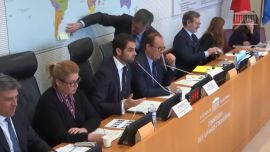From the moment Jorge Garbero walked into his office at Banco Nacion in Buenos Aires on Thursday, his phone rang nonstop. The calls came in, one after another, from mutual fund clients desperate to pull out their money.
“It’s been a deluge,” Garbero said while grabbing lunch downtown.
The night before, President Mauricio Macri’s government announced it was forcing local bond investors to accept longer maturities as part of a series of measures aimed at staunching capital outflows and stabilizing the peso amid a deepening financial crisis.
The rush for the exits was so intense that more than a dozen local mutual funds told regulators that they were temporarily suspending redemptions. The reaction in overseas markets was also swift. The country’s dollar-denominated bonds plunged toward a mere 40 cents on the dollar and the benchmark stock index reached a two-year low. Late in the day, S&P Global Ratings said the forced extension of local bond maturities constituted a “selective default.”
“For now, there is too much uncertainty for investors to feel comfortable,” said James Barrineau, the head of emerging market debt at Schroders. “I believe the government wanted to first stop the bleeding in the local market and then tackle broader debt issues.”
Macri’s plan to delay payments on $101 billion of debt did seem to help the peso -- after initially declining, it ended the day slightly higher. But it’s yet to be seen whether the gambit will help avoid yet another painful restructuring by a country that has earned a reputation as a serial defaulter over the past century. (Back in 2001, Argentina hit creditors with the biggest default in history, halting payments on $95 billion of bonds.)
International, dollar-denominated notes due in 2028 fell 2.9 cents to 40.2 cents on the dollar. The Merval equity index lost 5.8%. The peso gained 0.4% to 57.9 per dollar.
With the economy mired in a deep recession, inflation soaring and most investors unwilling to roll over short-term debt, Macri had little choice but to take drastic measures in the run-up to an election he will almost certainly lose. A primary held earlier this month -- which acted as something of a dry run for the actual Oct. 27 vote -- triggered the deepening of a year-long financial crisis when it showed that Macri, a free-market advocate, was trailing the leftist candidate Alberto Fernandez by a wide margin.
It’s unclear how successful Macri will be with his bid to ratchet back the financial pressure his administration faces. Argentina is looking to delay payments on $7 billion of short-term bills coming due by year-end, $20 billion of local-law bonds and $30 billion of foreign-law bonds.
Foreign-currency reserves have plunged $10 billion over the past month, including a decline of about $900 million Thursday, to less than $60 billion now.
The mutual funds froze operations amid discussions with the government on how to to curb redemptions from retail investors, and by the end of the day regulators announced individual holders of debt mutual funds would be exempted from having to roll over their holdings.
“The mutual fund industry should be hurt severely,” BNP Paribas analysts led by Gabriel Gersztein wrote in a note titled “The beginning of the end.”
Several fund managers were still weighing whether to allow investors to exit the funds.
“We expect that going forward we’ll enter a difficult redemption dynamic,” said Fernando Caffa, a partner at Compass Group, which administers mutual funds, in Buenos Aires.
The problem extends beyond individuals. Small- and medium-sized companies that invested in mutual funds to grow their capital are also looking to pull out, according to Caffa.
S&P cut Argentina’s foreign and local debt rating to “selective default” late on Thursday, saying that the plan to unilaterally extend maturities on short-term bills “constitutes default under our criteria.”
Macri took office less than four years ago amid a wave of optimism that drew a deluge of investment to South America’s second-largest economy. He settled creditor lawsuits that had dragged on more than a decade and returned to global capital markets with a splash, selling bonds that wouldn’t mature for 100 years.
But he soon ran into some obstacles, from persistent inflation he couldn’t tame to a global trade war, that thwarted his free-market goals. An expected economic surge never materialized, leaving the government with a debt load that’s now too big for it to handle.
Macri spoke Thursday morning to call for cooperation and dialogue with the opposition and said his government is addressing the debt issue. Fernandez’s camp, after initially saying he’d release a statement on Thursday, has since been mum on its views of the situation. Fernandez is likely to take over as the country’s next president on Dec. 10.
“A lot will depend on how Alberto Fernandez decides to handle it,” said Jens Nystedt, a portfolio manager at EMSO Asset Management in New York. “With his support this could be an important source of stability going forward, but he needs to be far more clear about the mutual responsibility of all candidates.”
Garbero, the investment adviser at Banco Nacion, feels fairly well protected from the economic tumult. He doesn’t have much in the way of savings, so isn’t concerned about a devaluation. And, in fact, since he has peso-denominated debts, a bout of inflation and a weaker currency would actually make it easier to pay back his obligations.
But Garbero is worried for his daughter, who works for healthcare provider Swiss Medical Group. That’s because the company’s owner, Claudio Belocopitt, said in a TV interview on Wednesday night that he wasn’t sure if he’d be able to pay wages or buy medicine because the company is invested in short-term securities that will be affected by the delay.
“I’d ask the economy minister if he’s ever had to pay wages,” Belocopitt said.
– BLOOMBERG




















Comments